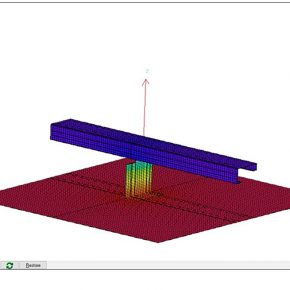
Seven ways smart sensors can improve concrete construction
In the bustling world of construction, time is a resource as precious as any material. Every second saved in assessing concrete strength and curing can mean earlier project completion, enhanced safety, and substantial cost savings.
Enter the age of smart construction, where the integration of technology with traditional building methods is not just a trend, but a fundamental shift towards efficiency and precision. Converge’s suite of smart sensors and solutions exemplifies this shift, offering groundbreaking ways to monitor and manage concrete construction in real-time.
Quality and sustainability
These innovations aren’t just about speed; they’re about building a future where every element of construction is optimised for quality and sustainability. The smart sensor technology brings to the fore the ability to make informed decisions quickly, ensuring that projects are not only completed faster but also built to last.

As the construction industry grapples with the demands of modern infrastructure and the need for environmental stewardship, smart sensors, and AI-powered analytics pave the way for a more resilient and responsible approach to construction.
1. Real-Time Strength and Temperature Monitoring
Converge’s sensors provide real-time data on the concrete’s temperature and strength. This continuous monitoring is crucial for determining when concrete has reached the necessary strength for further construction processes, which leads to better scheduling and reduced downtime.
2. Enhanced Accuracy
The data from the sensors offer reliable information regarding the concrete’s in-situ temperature and maturity level, which is essential for structural integrity. This accuracy helps to avoid potential errors and costly rework.
3. Time Efficiency
By enabling continuous monitoring, the sensor solutions save significant time compared to traditional testing methods that provide results at set intervals. This efficiency can lead to faster construction cycles.
4. Cost Effectiveness
Accurate data from sensors can lead to significant cost savings by reducing errors and the need for rework. Moreover, predictive analytics facilitated by sensor data can prevent cost overruns by enabling better planning and proactive management of the concrete curing process.

5. Advanced Capabilities and Predictive Analytics
Smart sensors have the ability to measure at multiple depths within a concrete pour, providing a detailed thermal profile to avoid issues like cracking. The sensor data, combined with predictive analytics, allows for proactive management of the curing process and reduces the likelihood of delays.
6. Sustainability
This AI technology promotes sustainable construction practices by minimising the overuse of materials and enabling less destructive testing methods. By optimising future mixtures, the use of cement can be reduced, making the concrete production process more efficient and environmentally friendly.
7. Safety and Integration with AI
The integration of sensors with AI and machine learning technologies can enhance safety measures by providing more accurate data on slab strength and load-bearing potential. The expectation is that integration will lead to more sophisticated analyses and improved construction processes.
The advancements in sensor technology represent a significant shift in concrete construction, enabling projects to be completed faster, with higher quality, and in a more cost-effective and sustainable manner. These benefits demonstrate how integrating smart technology into construction processes can lead to substantial improvements across the industry.
Latest news

26th July 2024
Enfield Speciality Doors completes world-class project for Atlas Copco HQ
A rundown office and warehouse building completely transformed into a modern headquarters for Atlas Copco has been fitted with more than 120 internal fire doors from Enfield Speciality Doors.
Posted in Access Control & Door Entry Systems, Articles, Building Industry News, Building Products & Structures, Building Systems, Case Studies, Doors, Interior Design & Construction, Interiors, Posts, Restoration & Refurbishment, Retrofit & Renovation, Security and Fire Protection, Sustainability & Energy Efficiency, Timber Buildings and Timber Products, Wooden products
26th July 2024
Abloy UK launches new white paper
Abloy UK, a leading provider of security and access control solutions, has launched a new white paper.
Posted in Access Control & Door Entry Systems, Architectural Ironmongery, Articles, Building Industry News, Building Products & Structures, Building Services, Doors, Facility Management & Building Services, Health & Safety, Information Technology, Innovations & New Products, Publications, Research & Materials Testing, Security and Fire Protection
26th July 2024
MCRMA Member Profile: David Roy, Director of Roofconsult
David Roy of MCRMA member company Roofconsult has more than 50 years’ experience to draw upon working in the building envelope sector and a unique perspective on how it has changed in that time.
Posted in Articles, BIM, Infrastructure & CAD Software, Building Associations & Institutes, Building Industry News, Building Products & Structures, Building Services, Building Systems, Cladding, Information Technology, Restoration & Refurbishment, Retrofit & Renovation, Roofs, Walls
26th July 2024
Strand: Enhancing Door Functionality and Safety
Craig Fox, Sales Director for Strand Hardware, outlines how door industry professionals might apply door limiting stays…
Posted in Architectural Ironmongery, Articles, Building Industry News, Building Products & Structures, Building Services, Doors, Facility Management & Building Services, Health & Safety, Restoration & Refurbishment, Retrofit & Renovation
 Sign up:
Sign up: